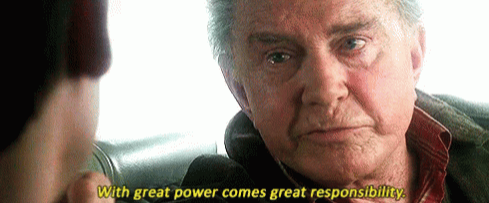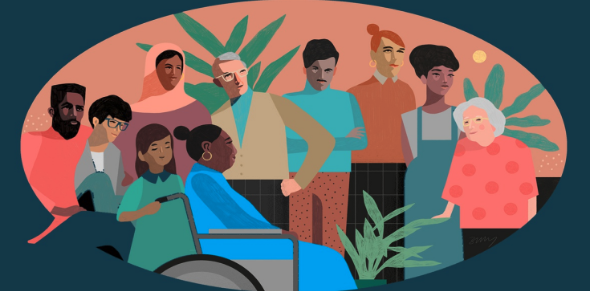Imagine sitting in a noisy global market laden with different vendors, each speaking a different language and each with a unique story to tell. Now, what if there were a group of people who could make it easier and fair for everyone to understand and respect all these vendors, despite the differences? Sounds nice right? Well, here comes in the role of communicators. Amidst this chaos there is a profound responsibility resting on the shoulders of the communicators: journalists, PR people, content developers—the people who have the power to wade through this ocean of voices to promote truth, transparency, and societal well-being.
But as Uncle Ben (We all need an Uncle Ben, don’t we!) wisely cautioned Peter Parker, With great power comes great responsibility, so, how might we as storytellers act responsibly and advance the mission of an increasingly ethical and inclusive world?

The power of Ethical Storytelling:
First, let’s talk about the power that ethical storytelling holds. For an international student like me, the intermingled world of rich cultural stories extends to instances of miscommunication that are hard to iron out. Hence, being able to share stories in an ethical manner is not a skill but a strong tool for societal goodness. As storytellers, communicators hold the power to design perception, bridge divides, and inspire change, therefore, this power has to be wielded responsibly.
Breaking Down Ethical Communication

© Brooke Cagle on Unsplash
Ethical communication does not end with not lying; it’s about actually fostering understanding and respect. The International Association of Business Communicators defines the concept as “truthful, accurate, and respectful” in all our interactions. The importance of such communication can’t be overstated, as we wade through a world where misinformation tends to go viral faster than the truth.
How Can We Promote Ethical Practices?
1. Embracing Radical Transparency
Imagine a world in which every PR statement, news report, or social media post acts as if it were a window to truth. Such a world requires communication specialists to be more than just being open; it calls for radical transparency. Radical transparency is an active approach to showing your cards and admitting mistakes, in simple words, being clear about your intentions. For example, when a brand apologises for its wrongdoing and actually cleans up the mess they made, it creates trust and respect.
2. Inclusive Storytelling

Our interlinked world creates such a space where inclusivity is no longer an option but a requirement. What a great opportunity as communicators: being able to shed light on diverse voices and break down stereotypes. That means a chance to give voice to the stories of marginalised communities with an honest and respectful approach.
Take the example of NPR’s own award-winning “Code Switch” podcast, which goes deep into race and identity in America. And in having a platform for multiple perspectives, it seeds the development of understanding and empathy between cultures.
3. Amplifying Our Voices:
We have always been taught that communication implies disseminating information but today we stand at the edge of an ever evolving understanding of communication. Now communication in itself is a continuum of both information and advocacy. Thus, we can use our platforms in championing what we believe in and really drive social progress. It can be as bold as Patagonia campaigns against environmental degradation or as subtle as a local blogger raising awareness about mental health issues within their community.
4. Fighting the Tide of Misinformation

© Tenor
Misinformation travels faster today than ever. It’s part of a communicator’s job to be a vigilant fact-checker. To that end, sites like Snopes and companies like Google, with its fact-checking features, supply us with tools to check information and get rid of false claims. By doing so, we can help preserve the integrity of public discourse as well as uphold the ethics of communication.
Case Study: Nike's Bold Stand
One strong example of using communication for advocacy is Nike’s “Just Do It” campaign. Starring Colin Kaepernick, the campaign stood up against racial inequality; despite facing the risk of a heavy backlash. Not just this, Nike went ahead and gave voice to the grief of those suffering from the harsh consequences of racial inequality in 2020 as well. This time around they went ahead with “Just Don’t Do It” in response to the rising racial inequality in America.
These campaigns were not just about shoe sales; they were a mindful and deliberate decision taken by the brand to stand for a cause it strongly believes in, starting nationwide conversations and proving what communicating for advocacy can do.
The Impact of Our Words
Words have the power to heal or hurt, to empower or belittle. As communicators, our mission goes beyond storytelling, it’s all about inspiring and uplifting the readers through the stories they experience everyday, stories that reflect truth and respect. In a world where every voice can be amplified, our obligation is to use our words to contribute toward a stronger, and kinder society.
Conclusion
Communication is very powerful; it bridges cultures and creates understanding. Therefore, ethical storytelling is not only a requirement in our profession, but more so it’s a human duty. We can remake a better and more connected world through our words, all we have to do is stand by transparency, inclusivity, and honesty.
So, whether you are a seasoned communicator or just starting out, remember: your voice has the power to make a difference. Let’s use it wisely.
References:
International Association of Business Communicators. IABC Code of Ethics. Retrieved from IABC
NPR. 2020. Code Switch. Retrieved from NPR Code Switch
Snopes. 2020. Fact-Checking and Misinformation. Retrieved from Snopes
Patagonia. 2020. Environmental Campaigns. Retrieved from Patagonia
Nike. 2018. Just Do It Campaign. Retrieved from The Guardian
Nike. 2020. Just Don’t Do It Campaign. Retrieved from Forbes

